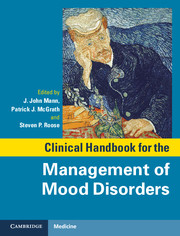Book contents
- Clinical Handbook for the Management of Mood Disorders
- Clinical Handbook for the Management of Mood Disorders
- Copyright page
- Contents
- List of contributors
- Section 1 Introduction
- Section 2 Medical management
- 4 Management of adult major depressive disorder
- 5 Atypical depression
- 6 Psychotic depression
- 7 Pharmacologic and somatic treatments for bipolar depression
- 8 Medication treatment of mania: Acute and preventive
- 9 Treatment of mood disorders in late life
- 10 Chronic depression
- 11 Pediatric depression
- 12 Therapeutics of pediatric bipolar disorder
- 13 Depression in the context of physical illness
- 14 Mood disorders in the context of borderline personality disorder
- 15 Depression in the context of pregnancy
- 16 Depression and the menstrual cycle
- 17 Depression in the context of alcoholism and other substance-use disorders
- 18 Complementary and alternative treatments for mood disorders
- Section 3 Psychotherapies for mood disorders
- Section 4 Specific modalities of treatment
- Section 5 The promise of biomarkers and response prediction
- Section 6 Future directions
- Index
17 - Depression in the context of alcoholism and other substance-use disorders
from Section 2 - Medical management
Published online by Cambridge University Press: 05 May 2013
- Clinical Handbook for the Management of Mood Disorders
- Clinical Handbook for the Management of Mood Disorders
- Copyright page
- Contents
- List of contributors
- Section 1 Introduction
- Section 2 Medical management
- 4 Management of adult major depressive disorder
- 5 Atypical depression
- 6 Psychotic depression
- 7 Pharmacologic and somatic treatments for bipolar depression
- 8 Medication treatment of mania: Acute and preventive
- 9 Treatment of mood disorders in late life
- 10 Chronic depression
- 11 Pediatric depression
- 12 Therapeutics of pediatric bipolar disorder
- 13 Depression in the context of physical illness
- 14 Mood disorders in the context of borderline personality disorder
- 15 Depression in the context of pregnancy
- 16 Depression and the menstrual cycle
- 17 Depression in the context of alcoholism and other substance-use disorders
- 18 Complementary and alternative treatments for mood disorders
- Section 3 Psychotherapies for mood disorders
- Section 4 Specific modalities of treatment
- Section 5 The promise of biomarkers and response prediction
- Section 6 Future directions
- Index
Summary
Keywords
- Type
- Chapter
- Information
- Clinical Handbook for the Management of Mood Disorders , pp. 234 - 244Publisher: Cambridge University PressPrint publication year: 2013



